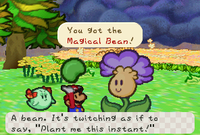Useful Item: Difference between revisions
Waluigi Time (talk | contribs) mNo edit summary |
|||
| Line 1: | Line 1: | ||
[[File:PM_Magical_Bean_screenshot.png|thumb|right|Mario obtaining the [[Magical Bean]], a key item in ''Paper Mario''.]] | [[File:PM_Magical_Bean_screenshot.png|thumb|right|Mario obtaining the [[Magical Bean]], a key item in ''Paper Mario''.]] | ||
'''Key items''', also known as '''Important Things''' in ''[[Paper Mario: The Thousand-Year Door]]'' and ''[[Super Paper Mario]]'', and '''Useful Items''' in ''[[Paper Mario: The Origami King]]'', are a category of [[List of items|item]] that appear in many [[Genre#Role-playing|role-playing game]]s, including those in the ''[[Mario (franchise)|Mario]]'' franchise. Key items are typically distinguished from ordinary items by being unique and one-of-a-kind, though in some cases, a finite number of copies may be obtained, such as in the case of the four [[Fortress Key]]s in ''[[Paper Mario]]''. They are usually necessary to progress in either the main storyline of a particular game, or otherwise in some sort of sidequest, and as such they cannot be as easily consumed or discarded as other items, except when doing so is necessary to progress. Similarly, in games with limited inventory space, such as ''Paper Mario'', key items usually | '''Key items''', also known as '''Important Things''' in ''[[Paper Mario: The Thousand-Year Door]]'' and ''[[Super Paper Mario]]'', and '''Useful Items''' in ''[[Paper Mario: The Origami King]]'', are a category of [[List of items|item]] that appear in many [[Genre#Role-playing|role-playing game]]s, including those in the ''[[Mario (franchise)|Mario]]'' franchise. Key items are typically distinguished from ordinary items by being unique and one-of-a-kind, though in some cases, a finite number of copies may be obtained, such as in the case of the four [[Fortress Key]]s in ''[[Paper Mario]]''. They are usually necessary to progress in either the main storyline of a particular game, or otherwise in some sort of sidequest, and as such they cannot be as easily consumed or discarded as other items, except when doing so is necessary to progress. Similarly, in games with limited inventory space, such as ''Paper Mario'', key items usually will not use up the inventory slots that are used for other items. | ||
Key items are sometimes distinguished from other kinds of finite, non-consumable items, such as [[Badge]]s and [[Clothing]], which may be given their own categories on inventory screens and other similar treatment. | Key items are sometimes distinguished from other kinds of finite, non-consumable items, such as [[Badge]]s and [[Clothing]], which may be given their own categories on inventory screens and other similar treatment. | ||
Revision as of 19:20, November 3, 2022

Key items, also known as Important Things in Paper Mario: The Thousand-Year Door and Super Paper Mario, and Useful Items in Paper Mario: The Origami King, are a category of item that appear in many role-playing games, including those in the Mario franchise. Key items are typically distinguished from ordinary items by being unique and one-of-a-kind, though in some cases, a finite number of copies may be obtained, such as in the case of the four Fortress Keys in Paper Mario. They are usually necessary to progress in either the main storyline of a particular game, or otherwise in some sort of sidequest, and as such they cannot be as easily consumed or discarded as other items, except when doing so is necessary to progress. Similarly, in games with limited inventory space, such as Paper Mario, key items usually will not use up the inventory slots that are used for other items.
Key items are sometimes distinguished from other kinds of finite, non-consumable items, such as Badges and Clothing, which may be given their own categories on inventory screens and other similar treatment.